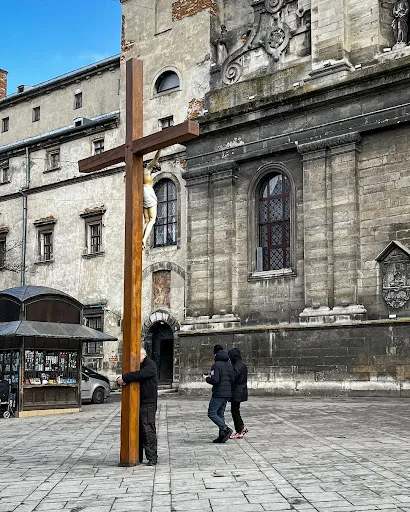
Washington, D.C. Newsroom, Mar 6, 2022 / 02:00 am (CNA).
A photo of an unidentified man hugging a life-size crucifix in Ukraine went viral across social media platforms as Russia began its full-scale invasion of the country.
The image captures a quiet moment in the midst of chaos: A darkly-clothed man embraces the crucifix in a courtyard outside by wrapping his arms around the foot of the cross. While the photo does not show his face, it reveals Jesus’ face, bent down toward the man. Two passers-by walk past him against the backdrop of an ancient, towering church.

The photographer, Dennis Melnichuk, snapped the image outside the Catholic Bernardine monastery and church in Lviv on Feb. 24. Then, he shared it with the world in a Facebook post.
At the time, Melnichuk told CNA, “I was feeling my heart quiver with unbelief and shock. Also, I felt faith rising in my heart.”
He spotted the man while walking to the church to pray.
“This was about three hours after the bombs went off in Kyiv; huge lines were at the banks, pharmacies, and stores as everyone was trying to stock up due to the uncertainty of what was to happen next,” Melnichuk recounted.
This man, instead, prayed at the foot of the cross.
In his caption for the photo, Melnichuk said that he and his wife, Anya, woke up to a phone call warning them that Kyiv was being bombed.
“Before heading east towards Ternopil, Ukraine, we went to grab groceries and extra cash from the ATM,” he wrote on Facebook. “We stood in line for about an hour to get our turn at the machine and found out that there was a $100 limit per person. The reality of martial law just hit us.”
“We are getting ready to help people get away and find housing for refugees — whatever we can do to help in this crisis,” he added.
Instead of fleeing, Dennis and his wife chose to stay in Ukraine to “be the hands and feet of Jesus on the ground,” their fundraising page reads. In other words, assisting and sheltering refugees through their ministry, Awakened Generation.
Awakened Generation, Melnichuk said, has worked to equip and activate the local church in worship, missions, and evangelism. Now, he told CNA, “we are serving refugees fleeing from the war and providing emergency relief and aid to those who are enroute west.”
“We are partnering with YWAM [Youth with a Mission] in Ukraine to give refugees a safe place to stop, sleep, eat, and rest, and help them find a safe way to get out west,” he added. “We have many groups coming in every day and are bracing for hundreds, even thousands, more.”
People can help them in multiple ways, he said: by praying and interceding, donating, and providing humanitarian aid, especially medical help.
Melnichuk comes from a Protestant background, he told CNA. While he himself is not Roman Catholic, he said that he “cherish[es] the rich history of Christ’s church, including it’s Catholic story.”
Both of his parents emigrated from Ukraine to the U.S., where they met and he grew up, he revealed in an online testimony in 2016. He later returned to the country as a missionary and has lived there for two and a half years. And, it seems, he and his wife have no plans to leave even as they help others escape.
“Our phones are slammed,” he wrote in a Facebook post on March 3. “We are getting hit with the first actual stream of refugees beginning the exodus out of crisis cities. The first wave was just a trickle compared to this. We’re doing our best to find answers and solutions.”
“Please pray for us to do this well,” he asked. “We need the grace of God.” In the meantime, he added, “I choose to keep smiling.”
“It is an honor to follow Jesus in a time like this,” he said in another post Wednesday. “Every day groups come in and we see the tired and shocked faces of people who have left everything behind and don’t know what lies ahead of them.”
“I have seen the church in Ukraine and around the world become one living body,” he said. “No labels or tag — just one purpose: love as we have been loved by God in Christ Jesus.”
If you value the news and views Catholic World Report provides, please consider donating to support our efforts. Your contribution will help us continue to make CWR available to all readers worldwide for free, without a subscription. Thank you for your generosity!
Click here for more information on donating to CWR. Click here to sign up for our newsletter.





Leave a Reply